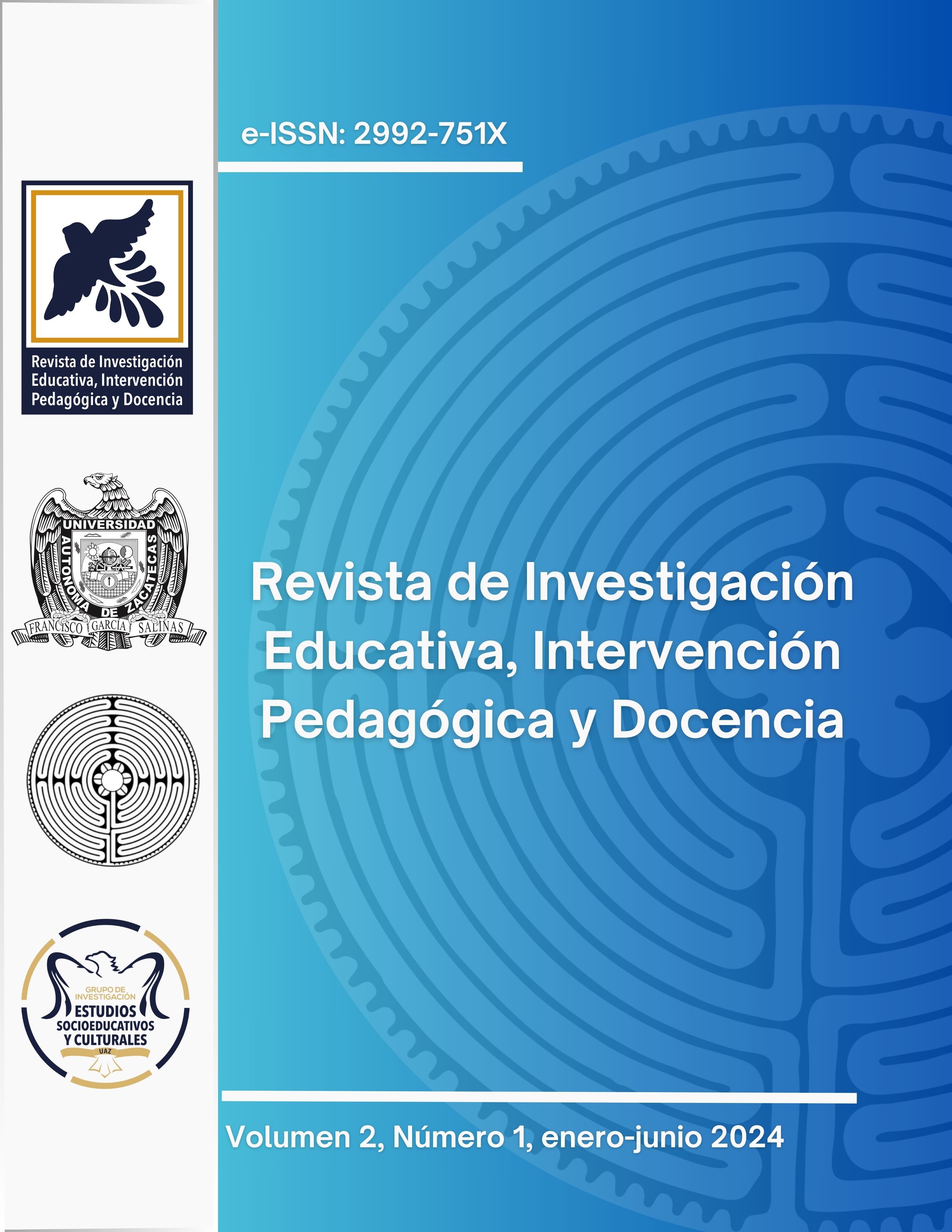Teaching Comprehensive Sexual Education in the Context of the Covid-19 Pandemic: an analysis of the educational approaches of the Initial Level of the Province of Jujuy in the Northwest of Argentina
Published 2024-04-29
Keywords
- pandemic, ,
- comprehensive sex education, ,
- early childhood education,,
- educational experiences,,
- pedagogical decisions
Copyright (c) 2024 Revista de Investigación Educativa, Intervención Pedagógica y Docencia

This work is licensed under a Creative Commons Attribution-NonCommercial-ShareAlike 4.0 International License.
How to Cite
Abstract
In the paper we analyze the approach and implementation of ESI at the Early Childhood Level in urban and
rural contexts, in times of pandemic, from the perspective of teachers and managers.
We analyze the challenges that teachers and parents/families took on in the construction of new
pedagogical tools to sustain the bond in everyday plots, framed from an approach that oriented, guided
and accompanied the children and their families. In contrast to the other educational levels, the
kindergarten needed to deploy other teaching strategies to generate the affective bond that every child
needs at this school age. We also placed in the center of the scene, the new didactic challenges that
reconfigured the teaching work, which allowed to execute the new practices from the
virtuality. Such strategies were implemented by teachers as new educational proposals to be able to
teach in these contexts. Likewise, in this scenario, we analyzed as limitations and obstacles that were
presented in both contexts -urban and rural-, the presence of digital gaps in the face of economic and
social inequalities, and the scarce family participation on the contents that were prioritized over others.
This research was carried out within the framework of the progress made in an ongoing research project
called "Obstacles and possibilities of Comprehensive Sexuality Education in the Province of Jujuy"
(SecTER-UNJU/CONICET. Within this framework, we present some advances in the analysis of the
interviews we have conducted with teachers and administrators of the initial level.
Downloads
References
- Batallán,. (1999). La aproximación de la etnografía para la investigación educacional. Reflexiones sobre su uso reciente en Argentina y Chile”. Revista IICE, VIII (14).
- Brailovsky, D. (2020). Oralidad en tiempos de pandemia. Perspectivas de Docentes de Nivel Inicial y unidad pedagógica de la provincia de Córdoba, Argentina. Anuario digital de Investigación educativa N° 5.
- Brown, A.; Martinez Ortiz, U.; Acerbi, M. y Corcuera, J. (Eds.) (2005). La Situación Ambiental Argentina. Fundación vida silvestre.
- Cruz, E. (2021). Historia y memoria auto etnográfica acerca de la divinidad y el culto andino de la tierra en el Noroeste Argentino, Revista Interdisciplinar de Literatura e Ecocrítica, 1(6), pp. 54-74. http://asle-brasil.com/journal/index.php/aslebr/article/view/129/92
- Decreto de Emergencia Sanitaria N° 260-2020. https://www.argentina.gob.ar/normativa/nacional/335423/texto#:~:text=%2D%20EMERGENCIA%20SANITARIA%3A%20Ampl%C3%ADase%20la%20emergencia,en%20vigencia%20del%20presente%20decreto
- Decreto provincial N°696-2020 https://coe.jujuy.gob.ar/archivos/documentos/LEG-RES-DEC696.S-P.E.pdf
- Decreto N° 5999-18. Diseño Curricular para la Educación Inicial. Provincia de Jujuy http://jujuy.gob.ar/wp-content/uploads/sites/37/2019/07/Presentaci%C3%B3n-Dise%C3%B1o-Curricular-de-la-Educaci%C3%B3n-Inicial.pdf
- Felman, D (2010). Didáctica general. Ministerio de Educación de la Nación.
- García S. (2019). La importancia del trabajo por rincones de aprendizaje en el último curso de la Etapa de Educación Infantil: elección de los mismos y elaboración de materiales. Trabajo de Grado en Educación Infantil. Universidad de Valladolid.
- Geertz, C. (1990). La Interpretación de las Culturas. Gedisa.
- Guber, R. (1995). La etnografía: Método campo y reflexividad. Grupo Editorial Norma.
- Guber, R. (1991). El Salvaje Metropolitano. A la vuelta de la Antropología Postmoderna. Reconstrucción del conocimiento social en el trabajo de campo. Legasa.
- Ley Nacional Nº 26.150 de Educación Sexual Integral.
- Maggio, M. (2020). Educación en Pandemia: Guía de superviviencia para docentes y familias. Paidos Educación.
- Molina, L. (1990). De la concepción a la actuación. Cuadernos de Pedagogía, (183), pp. 12-16.
- Pitluk, L. (2020). La centralidad del juego en la Educación Inicial: diferentes modalidades lúdicas. Homo Sapiens.
- Resolución N° 13928-E/2019 https://ifdc6m-juj.infd.edu.ar/sitio/wp-content/uploads/2021/03/2011-1082-503-19-MODIFICASE-PARC.-RES-13928-E-19-EDUCACION-MATERNAL.pdf
- Resolución Nº1067-E-/2020 https://ies1-juj.infd.edu.ar/sitio/wp-content/uploads/2020/07/1762-1082-81-20-REGIMEN-ACADEMICO-EXTRAORDINARIO.pdf
- Resolución Nº1067-E-2020 http://archivo.jujuy.gob.ar/archivos/1067-E-20--1097-E-20.pdf
- Taylor, J. y Bogdan, R. (1992). Introducción a los métodos cualitativos de investigación, la búsqueda de significados. Paidós.
- Torres, J. (1988). Prólogo a la Edición Española. En Goetz JP. Lecompte MD. Etnografía y diseño cualitativo en la investigación educativa. Morata.
- Vygotsy, L.S. (1966). El papel del juego en el desarrollo. Aprendizaje Visor.
- World Medical Association Declaration of Helsinki: Ethical principles for medical Research Involving Human Subjects. JAMA. 2013; 310 (20):1-95. http://jama.jamanetwork.com/article.aspx?doi=10.1001/jama.2013.281053


